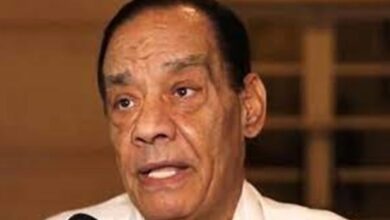Those who have witnessed recent Cairo protests know firsthand just how loud they can get. But as protesters continue to form temporary homes in Tahrir Square, the revolution has since found a new sound to balance the continuous soundtrack of anti-Mubarak chants. In a landscape dominated by tattered signs and banners, makeshift campsites, growing trash piles and the wreckage of conflict, the sight of a crowd gathered around a musician plucking at his oud or group of young men slapping their tablas has become increasingly common.
“Just because we’re protesting doesn’t mean we have to be miserable about it,” says Hany Habashi, holding his tabla snugly between his legs. For the past four days, the 21-year-old has attended Tahrir Square with a group of friends, bringing with them a variety of tablas, guitars, and riqs–the middle eastern equivalent of a tambourine–in an effort to “boost the morale of the people fighting for [their] rights.” Habashi and his friends spend their days walking around the square, positioning themselves in the midst of a group of chanting protesters, and providing a steady beat accompanied by vocalizations.
“It makes a difference,” Habashi insists. “You walk up to a crowd, and they’re like zombies, automatically responding to any chant that they hear, without even looking up. They’re exhausted, hungry and worn out,” he says. “When we start playing music, they become immediately alert, and before you know it, everyone’s dancing and cheering. It brings people together and reminds them that they are not alone, that we all support them.”
Habashi’s strategy is not uncommon. In fact, halfway through an enthusiastic performance by him and his friends, protesters were slowly drawn away by the more commanding sounds of the Sharqiya Melodic Mizmar Band, led by founder Walid Sharkawy. Like Habashi and his friends, the Sharkawy’s quintet roams the square, backing up any collective chanting with the screeching of their eponymous instrument, as well as a tabla, pounded on by an intimidating large, grim-faced man.
“I’m not merely a musician,” claims 26-year-old Sharkawy, as his band makes its way through the crowd, zeroing in on the sounds of nearby chanting. “I have a bachelor’s degree, but no job. I started doing this to make a living, and now, I can use this [band] as a way to oppose the government, and support all those doing so.”
It’s easy to get caught up in the hypnotic din resulting from four mizmars and a gaggle of desperate demonstrators, but others prefer a more nuanced approach. Twenty-nine-year-old Fady Michael frequents the square with his oud, finding a quiet corner and letting the crowds gather around him as he performs variations of classics by Sayed Darwish and Sheikh Imam, among others. Michael also writes original compositions for himself, as well as others. When Al-Masry Al-Youm met him, Michael had just finished working on a tune to accompany a poem written by a fellow protestor and artist, who wished to be identified as Madam Rawna. The two, who met by chance earlier that morning, were looking for the ideal place to perform their song, titled “Son of My Country.”
“In circumstances like this, music does more than motivate and inspire,” says Michael. “It embodies our national spirit, and the essence of our culture. It promotes love, all kinds of it. If you don’t love your country, how can you love anything, or anyone living in it?”
Michael can’t help but express concern that, in the upcoming days of reformation, people may lose sight of the things that “really matter.”
“The youth of this country need to rediscover their love for culture, and for all those things that define us as a people,” Michael says. “Before all this happened, people used to say that Egyptians didn’t like each other. Now you can see how much closer we’ve all become. Muslim and Christian, rich and poor–those lines have all been blurred. We’ve been reminded of how much we all mean to each other. When this is all over, we need to continue celebrating that love by celebrating our culture.”
Until then, Michael insists he will continue to visit Tahrir Square with his oud and encourage fellow protesters. “And if I lose my voice,” he smiles, “I still have my oud.”
The other musicians roaming the square agree. As his band gears up for another performance, Walid Sharkawy says, “It’s important to stay motivated, and to finish what we started.”
“When Mubarak leaves,” he says, “it will be to the beat of our drums.”




